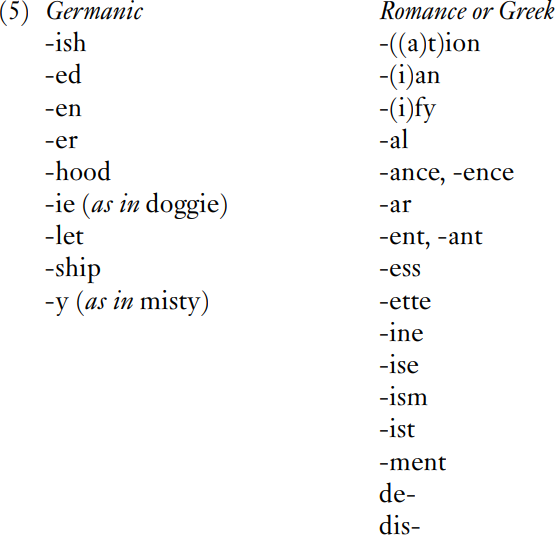


 Grammar
Grammar
 Tenses
Tenses
 Present
Present
 Past
Past
 Future
Future
 Parts Of Speech
Parts Of Speech
 Nouns
Nouns
 Verbs
Verbs
 Adverbs
Adverbs
 Adjectives
Adjectives
 Pronouns
Pronouns
 Pre Position
Pre Position
 Preposition by function
Preposition by function 
 Preposition by construction
Preposition by construction
 Conjunctions
Conjunctions
 Interjections
Interjections
 Grammar Rules
Grammar Rules
 Linguistics
Linguistics
 Semantics
Semantics
 Pragmatics
Pragmatics
 Reading Comprehension
Reading Comprehension|
Read More
Date: 2023-06-21
Date: 2023-09-20
Date: 2023-10-12
|
It was noted that the inherited Germanic root heart is free while the cognate roots cord- and card-, borrowed from Latin and Greek, are bound, and the same applies to inherited bear by contrast with borrowed -fer and -pher. If this kind of contrast is general, then it has implications for inherited and borrowed affixes too. We will expect that native Germanic affixes should attach to free bases, while the affixes that attach to bound bases should generally be borrowed. And this turns out to be correct.
At (5) are listed most of the derivational affixes that we have considered so far, classified according to their origin:

It is easy to check that all the affixes in the lefthand column select exclusively or almost exclusively free bases, while most of those in the righthand column readily permit or even prefer bound ones. Compare, for example, -let and -ette, which are similar in meaning and in lack of generality: both mean roughly ‘small’, though neither is perfectly regular semantically, and -ette also sometimes means ‘female’. If you are asked to list nouns formed with the suffix -let, you will probably think of examples such as booklet, piglet, droplet and starlet, all with clearly identifiable free bases. For nouns with the suffix -ette, your list is sure to include cigarette, and it may also include (depending on your country of origin) suffragette, laundrette, kitchenette, maisonette and drum-majorette. Among these, the bases cigar-, laundr- and maison- are bound, cígar- (with stress on the first syllable) and laundr- being bound allomorphs of cigár and laundry, and maison- having no free allomorph in English. So, although -ette is by no means restricted to bound bases, it does not avoid them in the way that -let does. The word hamlet meaning ‘small village’ may seem to be a counterexample. However, if, like me, you feel this to be a simple word rather than a complex one, consisting of a single morpheme rather than a root ham- plus -let, it does not count as an actual counterexample. (Historically, in fact, hamlet was borrowed from French, and contained originally the -ette suffix in a variant spelling.)
Similar conclusions emerge from comparing some abstract-noun-forming suffixes in the two columns: -ship and -hood in the Germanic column, and -(a(t))ion, -ance/-ence, and -ism in the Romance and Greek column. For the latter, it is certainly possible to find words whose bases are free (e.g. consideration, admittance, defeatism); however, many of the bases selected by these affixes are bound, being either bound allomorphs of roots that are elsewhere free (e.g. consumption, preference, Catholicism) or else roots that lack free allomorphs entirely (e.g. condition, patience, solipsism). In contrast, nouns in -ship and -hood always seem to have free bases: friendship, kingship, governorship; childhood, adulthood, priesthood. What we observe here is, in fact, the historical basis for a phenomenon that we noted: the root of an English word is more likely to be free than bound, yet a large number of bound roots exist in modern English also, thanks to massive borrowing from French and Latin.
Describing the affixes in the second column, I was careful to say that most of them permit bound bases, not that all of them do. Some borrowed affixes associate solely or mainly with free bases, and in so doing have acquired native Germanic habits. An example at (5) is the suffix -ment, as in development, punishment, commitment, attainment – though it is sometimes found with a bound base, as in the nouns compliment and supplement. Another example is the prefix de-, as in deregister, delouse and decompose. This tolerance for free bases is surely connected with the fact that, de- is formally and semantically rather regular, and can readily be used in neologisms (e.g. de-grass in The courtyard was grassed only last year, but now they are going to de-grass it and lay paving stones). For an affix restricted to bound bases, such a neologizing capacity would be scarcely conceivable in a language where, as in English, most bases are free.
|
|
|
|
تفوقت في الاختبار على الجميع.. فاكهة "خارقة" في عالم التغذية
|
|
|
|
|
|
|
أمين عام أوبك: النفط الخام والغاز الطبيعي "هبة من الله"
|
|
|
|
|
|
|
قسم شؤون المعارف ينظم دورة عن آليات عمل الفهارس الفنية للموسوعات والكتب لملاكاته
|
|
|